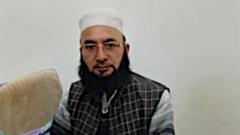Farooq Ahmed feels a deep-seated anger as he recalls the tragic loss of his brother, Mohammad Iqbal, who was killed during cross-border shelling on May 7 in Indian-administered Kashmir. Just hours after India's airstrikes in retaliation for a militant attack, the local teacher's life was extinguished, sparking a maelstrom of media controversy that would only worsen the family's grief.
According to Ahmed, Iqbal was committed to his role at Zia-ul-Uloom madrassa in Poonch, yet soon after his death, some media outlets wrongfully branded him a terrorist, asserting he had ties to extremist groups. "It was like having salt rubbed into our wounds," laments Ahmed. "How can they label someone who was a teacher and loved by his community?"
As reports circulated, the claims intensified. Indian authorities confirmed that 16 lives were lost during the military engagement, while Pakistan claimed civilian casualty numbers as high as 40. The media's equally sensational and misleading narratives sparked an environment rife with disinformation—one in which fabricated news and AI-generated videos proliferated alongside honest stories.
Manisha Pande, an independent media figure, noted the extreme levels of sensationalism and the profound impact it had on public perception. "The jingoistic and irresponsible coverage of this conflict was unprecedented," Pande asserts.
With the dust barely settled on their loss, the Ahmed family learned of the accusations made against Iqbal through a WhatsApp video showing his image alongside claims of his alleged terrorist activities. "We were shocked to learn of this mischaracterization,” Ahmed emphasizes.
Notably, several channels including Zee News and News18 perpetuated these inaccuracies before Poonch police issued a public statement clarifying Iqbal's true status as a respected religious figure with no affiliations to terror groups. "The damage was done by the time clarifications were made," Ahmed reflects, lamenting the magnitude of false narratives that had spread like wildfire, potentially influencing millions.
Though the Poonch police promised further action against those spreading misinformation, Ahmed insists any retraction came too late to reverse public perception. As he considers legal recourse against offending media, he grapples with the harsh reality of his brother's absence. Iqbal, a devoted husband and father of eight, was the family's main provider, and the government's compensation will only offer temporary relief.
“My brother was a quiet and gentle man,” Ahmed recalls, dying to ensure his children received an education. "But who will convey the truth about his legacy to those who believe he was a terrorist? Our pain remains unheard in the shadow of their narratives.”
The intertwined narratives of war and media sensationalism exemplify the precarious nature of truth in conflict zones, affecting lives beyond the immediate devastation wrought by violence.



















